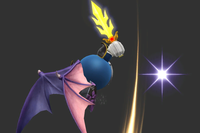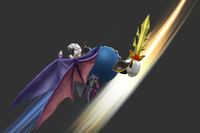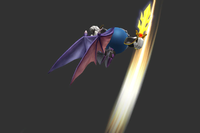Shuttle Loop
| Shuttle Loop | |
|---|---|
 Shuttle Loop in Super Smash Bros. for Wii U. | |
| User | Meta Knight |
| Universe | Kirby |
| Article on WiKirby | Shuttle Loop |
| “ | Jump and flip in midair, then glide forwards. | ” |
| —Brawl manual description | ||
| “ | Slash and fly in a circle, and then rise upward. | ” |
| —Description from the Super Smash Bros. for Nintendo 3DS Foldout | ||
Shuttle Loop (シャトルループ, Shuttle Loop) is Meta Knight's up special move. Meta Knight jumps into the air with his sword pointed upwards, goes into a loop, and in Brawl, glides forward with his blade extended.
Overview
In Super Smash Bros. Brawl
The Shuttle Loop does 9% damage, and has good knockback, making it one of Meta Knight's finishing moves. Meta Knight's grounded Shuttle Loop has vertical knockback and invincibility frames at the beginning of the move, while the air version has strong horizontal knockback, being a solid edge-guarding move due its high base knockback. The initial upswing of the Shuttle Loop is mostly used at the end of Meta Knight's combos.
It should also be noted that the end of the Shuttle Loop attack automatically initiates a glide, which can be used in addition to the vertical recovery to add good horizontal recovery. In addition, because Meta Knight can do a quick attack to conclude a glide, Shuttle Loop can be timed to do two consecutive attacks - the initial upswing, and the quick swing from the glide. The glide from this attack is slower than his regular glide, and allows better control.
Using Shuttle Loop while facing off of the edge can be quite dangerous, for unless the player quickly cancels the glide, he/she could easily glide right off the stage with no chance of recovery. Also, landing while in the glide puts Meta Knight on the floor, and the opponent can easily punish him. Using his glide attack or just pressing the special move button right before hitting the floor completely cancels the attack and landing lag, which leaves him in an ideal position to evade attacks or hit opponents.
In Super Smash Bros. 4
In Super Smash Bros. 4, the attack no longer cancels into a glide; however, it gains slightly more vertical distance and hits twice extremely quickly. The move now does a total of 15% damage (12% in the air) and retains its high base knockback from Brawl, still making it a viable finishing move. As a recovery, the distance it can gain is toned down due to the removal of gliding, but the move still gains good vertical distance. This version is similar to the original Shuttle Loop that Wing Kirby performs, in that it hits twice and only sends Kirby a short distance forward rather than a glide.
Customization
Special Move customization was added in Super Smash Bros. 4. These are the known variations:
| 1. Shuttle Loop | 2. Blade Coaster | 3. Lazy Shuttle Loop |
|---|---|---|
| "Fly into the air and strike, and then strike again after looping." | "Fly forward instead of up. Enemies hit will be launched at a lowe angle." | "Do a slow loop, and then strike hard while rising quickly." |
- Shuttle Loop: Default.
- Blade Coaster: Increases the startup of the move, but makes the angle Meta Knight travels at much more horizontal, allowing him to cover more distance.
- Lazy Shuttle Loop: A slower loop, then strike with a single attack. It has increased vertical height, though it has a different startup animation that lasts longer and removes the initial hit, making the move harder to KO with.
Blade Coaster launching in Super Smash Bros. for Nintendo 3DS.
Lazy Shuttle Loop launching in Super Smash Bros. for Nintendo 3DS.
Origin
Shuttle Loop is likely based on Kirby's Wing Copy Ability. It was used by Kirby in the SNES game Kirby Super Star when he received the Copy Ability. The only differences are that it didn't make Kirby glide and it lacked the sword. In addition, the Wing ability's attack required the player to toss an enemy first.
Gallery
Meta Knight launching with Shuttle Loop in Super Smash Bros. for Nintendo 3DS.
Meta Knight gliding with Shuttle Loop in Super Smash Bros. for Nintendo 3DS.
Trivia
- This move is also used by Meta Knight in the Kirby game, Kirby's Return to Dream Land.









